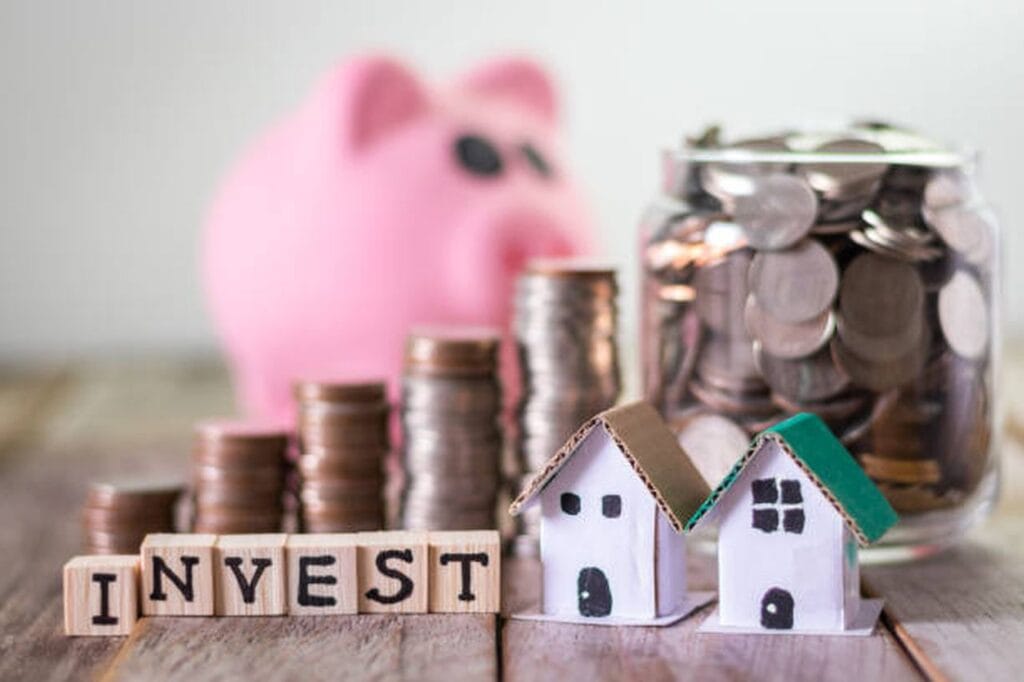If you want to lower your overall investment risk, diversifying into real estate is a great idea. This can be accomplished through a variety of real estate investment methods. Some choices have the same passive quality as owning dividend-paying equities or real estate investment trusts (REITs).
There are benefits and drawbacks to adding real estate to your investing portfolio, just as there are with any other type of investment.
The Pros Of Investing In Real Estate
Real Estate Appreciates Over Time
Real estate that has been carefully selected tends to increase in value over time at a rate that significantly outpaces inflation. The market does experience normal fluctuations, and it is possible to make a poor choice in real estate investments at inopportune times. Our experience, however, has shown us that there is always an opportunity to purchase a high-quality property at a discount, make modifications to boost equity, and then sell the home for a profit.
Buying low and selling high is a common real estate strategy. Land also retains its inherent value throughout time. Unlike a stock, which can go to zero, real estate has inherent value in the form of the land itself and the "improvements" (the buildings that have been constructed on top of it).
Real Estate Has Special Tax Benefits
Investors can enjoy compounded growth of their wealth because of the special tax treatment of real estate. Real estate investors can avoid paying self-employment tax on rental income, and there are other tax breaks available. Depreciation and considerably reduced tax rates on long-term gains are two examples. In addition, if you are an investor or a real estate professional, you may be able to deduct a sizable portion of your rental income from your taxable earnings. Further, since managing rental properties is a business, many of the costs you incur doing so, including mileage and lodging for inspection trips, are deductible.
Real Estate Generates Consistent Cash Flow
Cash flow is a monthly revenue stream that can be generated by investing in rental properties. The surplus is what's left over after essentials have been covered. After you've gotten your property set up, you may use the passive monthly income from cash flow to focus on other things, like growing your business, spending time with family, or buying more investment property.
Real Estate Allows You To Use Leverage.
Leverage can help you increase your real estate portfolio and your wealth more quickly. The term "leverage" refers to the practice of borrowing money to make an investment, with the intention of increasing that investment's prospective return. Leverage is a significant benefit of real estate investing, especially when used prudently to reduce risk. A conventional loan, which only requires a 20% down payment, can be used to purchase an investment property.
If you invest $30,000, for instance, you can potentially get the right to manage an asset with a value of $150,000, as well as enjoy all the benefits of ownership. With caution, leverage can help you amass money quickly, especially in the current low-interest-rate market.
Real Estate Builds Equity
When leverage is used properly, the renters essentially pay the property's purchase price. Monthly rental proceeds go towards principal reduction and the accrual of equity. Your monthly wealth will increase thanks to your tenant's payment on your mortgage when you use a mortgage to acquire a rental property. This can be compared to a savings account that accrues interest over time without the need for you to make regular deposits.
If a tenant is paying the mortgage on your rental property, your debt could go from $200,000 today to $195,000 next year. It's paid off in full after 30 years (or however long your loan term is). Now that your tenant is paying the mortgage, you have a valuable asset at your disposal.
Real Estate Gives You Control
When compared to other types of investments, your success in real estate is more within your hands. You have no right to a seat on the board of directors or any say in the company's management or the value of its stock. When you invest in real estate, you get to make a lot of important calls. Real estate investing is a great way to spread your risk and accelerate your portfolio growth. It is entirely up to me whether or not You become successful as a real estate investor. You can hustle when it comes to finding deals. In a very competitive rental market, You take measures to ensure that only the most qualified tenants are drawn to my properties. The ability to strategically raise rental income is not in question.
Real Estate Can Be Bought Below Market Value
Real estate can be purchased at a discount if the seller is motivated to sell soon and you have the cash on hand to satisfy their immediate financial need. If you want to take advantage of these discrepancies, you need to have a thorough understanding of the local real estate market, which is much simpler to get if you devote yourself to real estate investing full time. Agents in this industry are experts at finding homes for less than the going rate.
Real Estate Generates Consistent Cash Inflows.
Rent from a property can be a reliable source of income. In addition, utilities like laundry, storage, and parking may cost extra at some residences. Net cash inflows could be considerable if expenses like mortgage payments, taxes, upkeep, and so on are low.

Depreciation Tax Shelter Provided By Real Estate
Real estate depreciation is an allowable tax deduction that lowers taxable income without requiring any out-of-pocket expenses. Commercial buildings have a depreciation time of 39 years, while homes have a depreciation period of 27 and a half years.
Real Estate Appreciates Value
In general, real estate appreciates in value, but this trend varies by region and is driven by market conditions. These factors can vary widely even over short distances, but a well-selected piece of real estate can generate impressive returns over time. You may also see a significant rise in value as a result of your efforts to fix up the property, especially if you have a knack for doing so.
Real Estate Provides An Inflationary Hedge
The effects of persistent inflation on investment returns are generally negative. Real estate, on the other hand, typically appreciates at a greater rate than inflation does and has not followed this pattern historically. Real estate is more likely to see increased bidding during periods of high inflation because some investors view it as a means of protecting their wealth from rising prices. A rise in real estate values is possible during times of unpredictability because of the perceived safety of real estate investments.
Benefits Of Leverage Are Created By Real Estate Financing
Securing a mortgage for 70-80% of the property's purchase price is common practice when investing in real estate. This debt is so large that it doubles the property's profits. For instance, if you put down $50,000 and borrow the remaining $200,000 to buy a rental property that would net you $25,000 a year, you will have made a return of $50,000, or 50%, on your initial investment.
Real Estate Defers Taxes
Gains in property value are not subject to taxation until they are realised through a sale, which could happen several years after the initial investment. The tax deferral period can be further extended by rolling the gain into some other real estate investment, as allowed by the existing tax legislation. With the use of these procedures, you may be able to permanently avoid paying capital gains taxes when selling a home.
Real Estate Income Increases Gradually
If you can raise rents at the same rate as inflation, your income will rise over time as your principal expense (a fixed-rate mortgage) is reduced. It causes the property's rate of return to rise over time. If you can avoid getting a mortgage with a variable interest rate, you'll be in a better position.
Real Estate Enables Active Investment Control.
The majority of investors buy stocks or bonds, where they have no say in the ups and downs of the money generated. However, that is not how real estate works. Active investors, on the other hand, may shop around for the greatest bargains, keep expenses in check, determine which prospective renters are serious, and know when to cash out. A greater impact on your earnings potential can be exerted through active participation in all facets of the investment process. In other words, the sum of your earnings is entirely dependent on your own efforts.
FAQs About Builders
Real estate is generally a great investment option. It can generate ongoing passive income and be a good long-term investment if the value increases. You may even use it as a part of your overall strategy to begin building wealth.
Real estate investing can be lucrative, but it’s important to understand the risks. Key risks include bad locations, negative cash flows, high vacancies, and problem tenants. Other risks to consider are the lack of liquidity, hidden structural problems, and the unpredictable nature of the real estate market.
Real estate investing is also hard! Real estate investing requires an initial investment of personal effort and time. And while it can be passive eventually, buying and owning properties is more like a part-time or full-time job at first.
It is very common for first-time investors to lose money in real estate. Many problems can occur – from water leaks that damage your walls to bad tenants that won’t pay up. If you’re looking to invest in real estate, there are many factors to consider.
Investing with debt is safer with real estate. Also known as your “mortgage,” you can invest in a new property with a 20% down payment or less and finance the rest of the property’s cost. On the other hand, investing in stocks with debt, known as margin trading, is extremely risky and strictly for experienced traders.
The Cons Of Real Estate Investment
Real Estate Needs Money
Obviously, monetary resources are necessary for commercial success. Put that advice from experts who say, "You can get rich buying real estate using OPM (Other People's Money)" out of your head. Real estate investments require a larger cash outlay than stock market purchases. To get started, you will need money for a down payment, closing costs, and any necessary repairs or updates to the property in order to optimise rental income. Even after you've paid off the mortgage and made all your principal payments on the property, you'll still have to pay taxes, insurance, and maintenance costs.
Real Estate Is Time Consuming.
Dedicating some time to studying the market and handling your properties might be beneficial. The real estate market has a steep learning curve, and inexperienced investors can lose significant sums of money. As an added downside, managing a portfolio of rental properties requires significant effort and time.
Real Estate Is A Long-Term Investment
Buying real estate with an eye towards the future is a good tactic. You're making an investment in a physical good that won't be easily converted to cash in a pinch. Selling a home takes longer and has higher transaction expenses than selling stock.
Real Estate Can Be Problematic
Tenants are a potential source of headaches, lost time and resources, and legal action. The cash flow of a landlord might suffer a serious impact if a tenant either doesn't pay rent or leaves the rental in a bad state after tenancy ends.
Real Estate Investing Is A Long Grind
If you buy wisely and put in the time and money to keep your properties in good shape, your real estate investment profits will build up over time. It's possible you'll need to devote a lot of time to property management too, depending on what you've bought and the type of tenants you have. Taking a vacation may be out of the question if you intend to handle property management on your own.
Real Estate Income Can Be Variable
Sometimes you may experience a financial loss. This is especially likely if you put down a little amount for a down payment and now have a hefty monthly mortgage payment. And if demand is low, you might not be able to rent the place out at all, or you might not be able to charge as much. This is especially true if the place is fundamentally flawed, such as when a major employer in the area shuts down and lays off a large number of locals.
Maintenance Is Required for Real Estate
A broken water heater or a leaking roof are just two examples of the sorts of maintenance problems that might arise out of nowhere. Because of this, you may need to spend a significant amount of money fixing or replacing it. When a newly purchased house has an issue that wasn't uncovered during the home inspection, it can come as a rude awakening.
Rent Control Impacts Real Estate
The freedom to increase rents on residential properties you own is at risk if the local government institutes rent controls. A targeted rent rise may be requested from a rent control board, however approval for such a request is usually met with reluctance.
Real Estate Requires Your Time
Real estate investing is a time-consuming endeavour. You will need to do research on the areas you plan to put money into, spot red flags in the properties you're eyeing, and address any maintenance issues that arise. While hiring a property management to handle tenant issues can alleviate some stress, managing the manager still takes time.
The Cost of Real Estate Transactions Is High
In real estate, transaction fees can add up quickly. Commissions, title insurance, origination fees, and other closing costs can quickly eat up any profit from the market increase. Properties can only recoup these expenses by being held for several years, during which time they should gain significantly. The commision paid to the real estate agent plays a significant role in these sums and can change depending on the type of property being bought or sold. If you're looking to buy or sell a standalone house, you might expect to pay a hefty commision.
Real Estate Income Is Subject To Taxation
Both rental income and capital gains from the sale of a property are subject to income taxes at the federal and state levels. As was mentioned before, however, there are scenarios in which a property's sale gain is not immediately taxable.
Real Estate Values Can Decline
If the real estate bubble drove prices much higher than the long-term trend, a subsequent crash could result in a significant short-term decrease in market value. You can lose your initial investment if you buy a property around its top for a low down payment, only to have its value drop and force you to sell at the market's low point.
Real Estate Rents Can Decline
If the economy is in a downturn, it may be difficult to locate reliable tenants. With a prolonged downturn, you may find yourself saddled with maintenance, mortgage, and utility bills, with little rent income to balance the expense. Or, you could have a string of problematic renters.
The Effects of Real Estate Leverage Can Be Negative
The leverage effect, which has been cited as a benefit of real estate investing, can also work to increase your losses. If we go back to the earlier scenario of putting down $50,000 on a $300,000 rental property, and that investment ends up losing $25,000. You will have lost half of your initial investment of $50,000 (a return of -50%). Consequently, taking on debt to finance property purchases can be a sound financial strategy, or it can backfire spectacularly.
Real Estate Is Not Liquid
Selling real estate in a short amount of time can be challenging. If you need a large sum of money quickly, this could be an issue. A vulture investor is one who swoops in when the seller is desperate for money and offers to buy the property for much less than it is worth. In some cases, it might cause a major drop in selling price.
Holding real estate for a long time, keeping a cash reserve to keep you solvent through negative cash flow scenarios, and reinvesting proceeds from property sales are all ways to lessen the impact of these drawbacks (to avoid taxes). There are drawbacks to investing in real estate, but you can mitigate the risks.
Conclusion
The question then becomes: Should you put your money into real estate? The opportunity to amass a large fortune through prudent real estate investing is a clear advantage. However, you should weigh the potential downsides before making a final choice. It takes a lot of money and expertise to get your feet wet as an investor, so getting started might be challenging. No assurance that your investment will provide a profit, even if you have the necessary funds. It's also wise to complete your homework before investing in real estate because of the market's inherent uncertainty.


